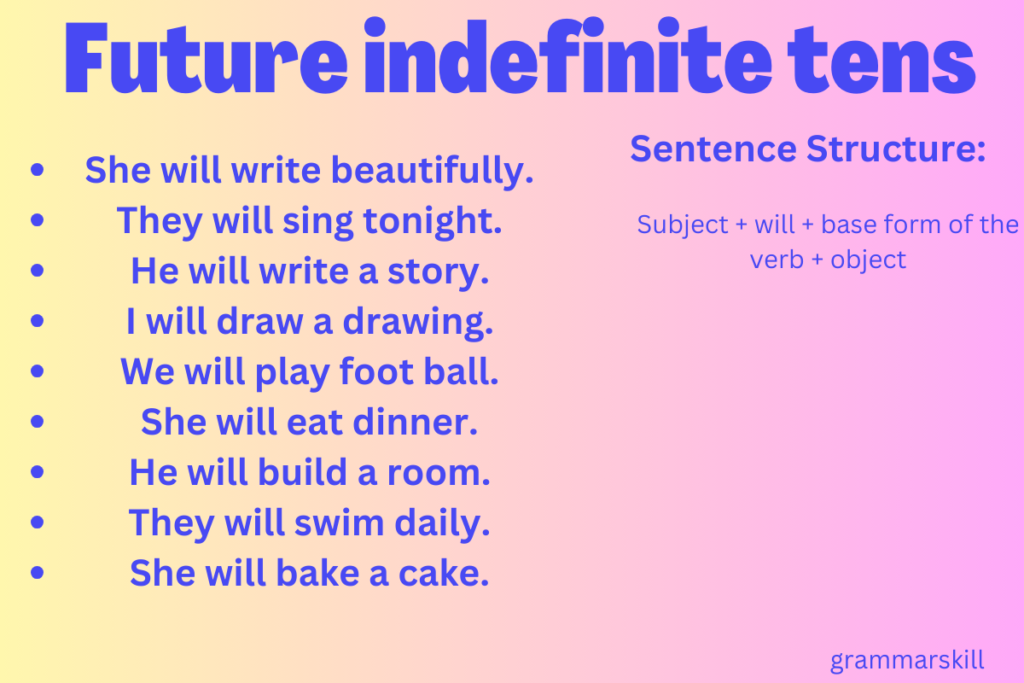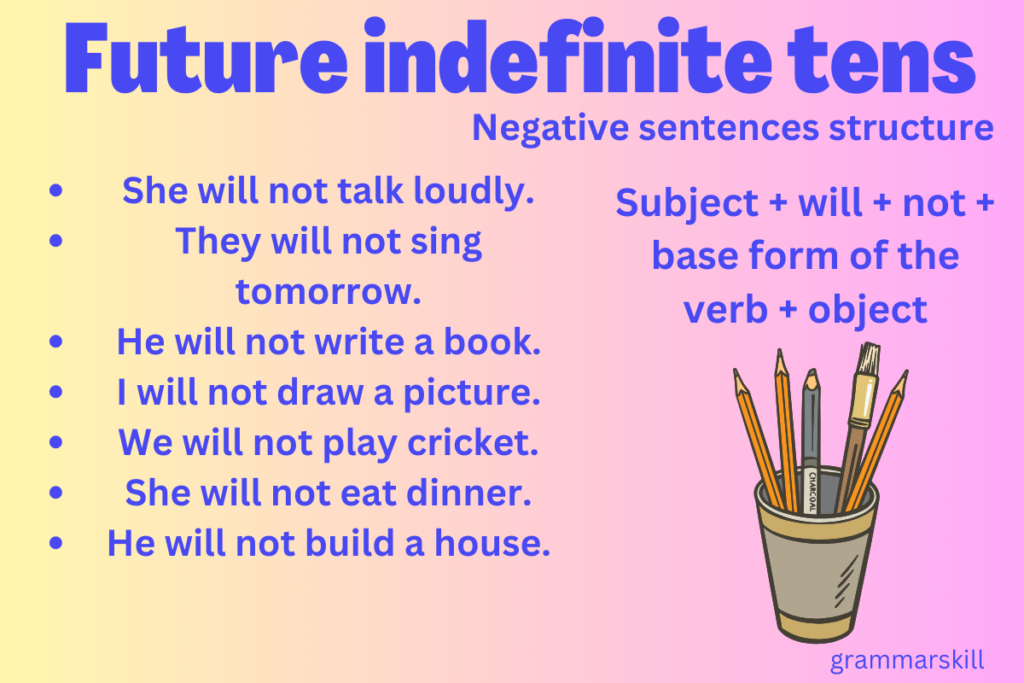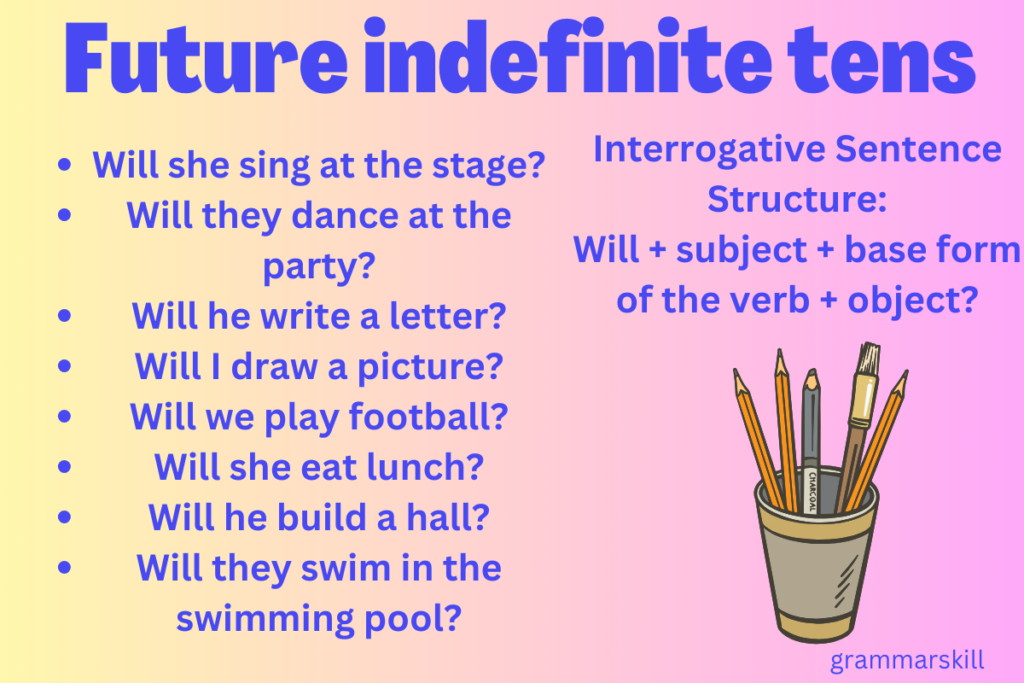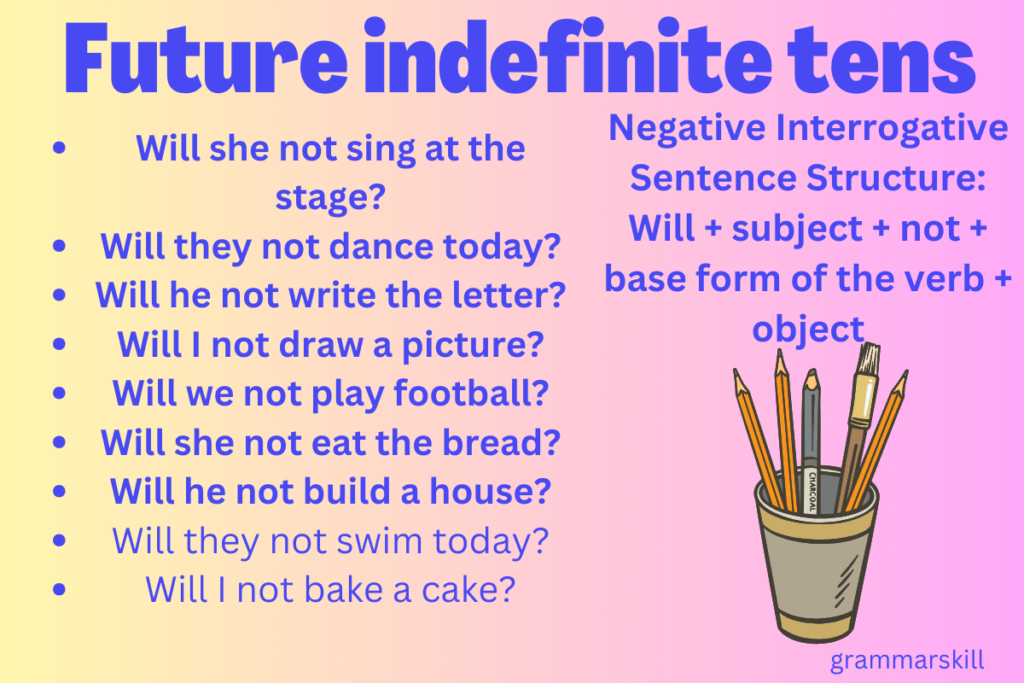The future indefinite tense ,commonly applied to as the simple future tense, allows us to express those very promises and possibilities in English. It’s the speech form l that helps us convey what we will do or what will happen without delving into problems. Mastering this tense can significantly enhance your communication skills.
let’s we’ll explore 80 engaging examples of sentences using the future indefinite tense. Future indefinite tense help us improve our language skills .So get ready to dive into an intriguing collection that not only clarifies grammar concepts but also enhance your language skills. In this article explain this tense with very easy method.
20 Positive Future Simple Tense Sentences
Sentence Structure:
Subject + will + base form of the verb + object
- She will write beautifully.
- They will sing tonight.
- He will write a story.
- I will draw a drawing.
- We will play foot ball.
- She will eat dinner.
- He will build a room.
- They will swim daily.
- She will bake a cake.
- He will drive to work.
- We will read a story book.
- He will teach English.
- They will run an Olympics race.
- I will paint the house.
- She will press a dress.
- He will fix the bike.
- We will visit the market.
- They will plan a tour.
- I will organize the school event.
- She will clean the bed room.

20 Negative Future Indefinite Tense Sentences
Negative Sentence Structure:
Subject + will + not + base form of the verb + object
- She will not talk loudly.
- They will not sing tomorrow.
- He will not write a book.
- I will not draw a picture.
- We will not play cricket.
- She will not eat dinner.
- He will not build a house.
- They will not swim in the river.
- I will not bake cake.
- She will not drive car.
- We will not read books.
- He will not teach yesterday.
- They will not run with us.
- I will not paint the room.
- She will not sew a pillow.
- He will not fix the car.
- We will not visit the market.
- They will not plan a tour.
- I will not organize the event.
- She will not clean the house.

20 Interrogative Future Indefinite Tense Sentences
Interrogative Sentence Structure:
Will + subject + base form of the verb + object?
- Will she sing at the stage?
- Will they dance at the party?
- Will he write a letter?
- Will I draw a picture?
- Will we play football?
- Will she eat lunch?
- Will he build a hall?
- Will they swim in the swimming pool?
- Will I bake cookies?
- Will she drive to the market?
- Will we read the magazine?
- Will he teach Urdu?
- Will they run in the ground?
- Will I paint the wall?
- Will she sew a frock?
- Will he fix the bike?
- Will we visit the zoo?
- Will they plan the engagement?
- Will I organize the meeting with parents?
- Will she clean the lawn.

20 Negative Interrogative Future Indefinite Tense Sentences
Negative Interrogative Sentence Structure:
Will + subject + not + base form of the verb + object?
- Will she not sing at the stage?
- Will they not dance today?
- Will he not write the letter?
- Will I not draw a picture?
- Will we not play football?
- Will she not eat the bread?
- Will he not build a house?
- Will they not swim today?
- Will I not bake a cake?
- Will she not drive bus?
- Will we not read the story?
- Will he not teach history?
- Will they not run in the marathon?
- Will I not paint the table?
- Will she not sew the dress?
- Will he not fix the fan?
- Will we not visit the laboratory?
- Will they not plan the picnic?
- Will I not organize the classroom?
- Will she not clean the room?

FAQs
What is the rule for future perfect indefinite tense?
The future perfect indefinite tense, also known as the future perfect tense, is used to describe actions that will be completed before a specific point in the future.
What is the future indefinite tense in simple sentence?
The future indefinite tense, also known as the simple future tense, is used to describe actions that will happen at a later time.
What are the rules for future tense?
Future tense is basic used to describe actions or events that will happen after the current moment. There are several ways to express the future tense, with the most common forms being will, going to, and the present continuous.
Conclusions
The future indefinite tense perform as a basic tool for expressing actions that will be at any point after the present. It allows speakers to communicate plans, forecast, and promises with clarity and confidence. Mastering this tense not only enhances one’s ability to convey future intentions but also improve overall language skills. As we do communication it helps us convey our message and helps in understanding others thought. Embrace this essential aspect of grammar and start practicing today to elevate your communication!
